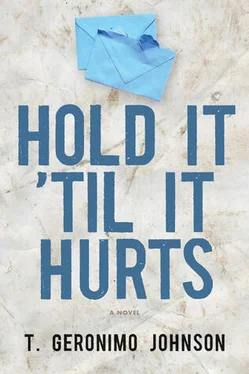It didn’t take long for the saying to catch on throughout the office (in Keller’s words, Hitting the corners faster than a paralegal afraid of being fired ). After a fruitful deposition, once the deposed was out of earshot and the recording equipment powered down: Fuck your couch, Zigga! After hanging up with the DA’s office: Fuck your couch, Zigga! After a successful court appearance, the young turks charged into the building like linebackers into the locker room, ties loose instead of helmets off, doing everything except patting each other on the ass, yelling, in harmony: Fuck your couch, Zigga!
He imagined them trying that at Kikkin Chikkin, but he never mentioned any of it to Ines. Where would he begin without appearing accusatory and ungrateful? How could he explain the problem without inviting Keller or someone else to ask, “Why can’t we use zigga if you can?” Never mind that Achilles had only used it once; he was indicted by every black person who used it routinely, and he had no logical answer for why his white coworkers and bosses shouldn’t use it except that it made him uncomfortable. But how could he explain that without sounding like he was whining? How could he explain it without Ines thinking he wasn’t man enough to handle himself? Then there was always the chance that she might go off the chain about it, fly down there for an emotional drive-by and leave Achilles feeling like a child, when he was no one’s victim, no crybaby, no snitch.
Besides, it’s not like they knew he heard them making those jokes behind closed doors. And he liked some aspects of the job. He enjoyed going to the courthouse to look up deeds and delivering documents. It was easy work, and he liked the uniform. Maybe Wexler was smart to work alone, but in the army no one did anything alone; they operated as a team, a group, a collective, a brotherhood, and there was security in knowing your team had your back, that even if they wouldn’t die for you, they wanted to live badly enough to return fire. So you forgave them every other deficiency, because man knows no trait more valuable than loyalty. He knew Wexler was loyal, but his rant about drug dealers having no other options was ridiculous. Even Ines didn’t think that. They should be lined up and shot! she always said. “That’s the dumbest fucking thing I ever heard you say. Poor drug dealers can’t get a job. What the fuck?” barked Achilles.
Sighing, Wexler moved along the ceiling two inches, removed a nail, pried the moulding out a bit, moved down two more inches, removed a nail, and pried the moulding out a little bit more. He stuck his finger in one of the many holes in the wall and ripped off a strip of wallpaper. “I know you’re thinking, ‘Why not just tear it down? Why not tear it all down?’” Wexler tapped his temple with his finger and said, “But people like old houses. When it’s put back together, this will be better than anything new you can buy, because they don’t make this stuff anymore.” Wexler set down his hammer and crowbar and glanced around the room with a smile. “This is history. Do you know how many people it took to put this together? And it was hard work back then. Manually operated drills. No such thing as nail guns. If you knock it all down, you’ll lose the good with the bad. And there’s a lot of good that went into this house, too. Can’t just come in and say you’re going to knock out a busted wall. Whole thing might cave in on you.”
Wexler really had changed. Standing there with his friend, Achilles felt very lonely, lonely for Ines. He understood Ines. He didn’t understand Wexler and being born again. He didn’t understand the new Wexler. Achilles didn’t even understand himself when he was with Wexler. He wanted to shout. He wanted to shake Wexler, shock him out of his calm. They needed necessary fun, to go to the strip club, or pick up some hookers, or shoot at somebody. It felt unearned, unjust, unfair that Wexler, always the most excitable of them, should have the gravity, tranquility, and certainty that had for so long eluded Achilles. Wexler was at home in his skin, as was Ines, but Ines centered Achilles while Wexler’s right-steady rudder confused him, made him feel abandoned, as if Wexler had set sail on a ship now vanishing over the horizon. Wages had a baby. Janice was married. She still called every couple of months, and he still ignored her calls. He spoke to his mom, at least briefly, every two to three weeks. She was still planning that trip. And his brother was living his own life, and his father was gone. Maybe everyone had moved on except him.
The clerk took one look at Achilles’s license, praised his foresight, and promised him a nice room, one with the ice and vending machines nearby but not close enough to be a disturbance. The small room had a kitchenette, a shower with a tub, and two double beds. Western was the theme: orange cowboy hats woven into the brown carpet, paintings of horses gracing the walls, the curtain-rod metal molded to resemble knotted rope, and beyond the drapes, the balcony offered a clear view of the parking lot and highway. After sunset, the soda machine glow suffused the room like red illume, the lights they used on night missions, not that he planned to sleep in the room. Satisfied that he had made adequate preparations for Ines’s arrival, he returned to Wexler’s house, where he had the use of a bedroom but usually dozed off on the couch, undisturbed by Wexler on the loveseat, curled up like a cat and snoring like a dog.
“Connie, Connie, Did you hear that?” Wexler whispered every morning around zero-ass-thirty back when they were on rotation. Achilles scrambled for his gear the first few times it happened, holding his breath, his ears out for things going bump in the night, but eventually he suspected that Wexler heard nothing, that he was only recruiting a partner for late-night conversations, and Achilles’s cot, unfortunately, was closest. Achilles imagined him tiptoeing through the tent, whispering in everyone’s ears until someone awoke, so he started ignoring him, and soon enough it was Troy and Wexler up talking through the night, sometimes getting silly and switching peoples’ boots or uniforms or underwear, though never in the field, of course.
So when Wexler woke him at zero-dark-thirty the night he’d gone to the Bricks, Achilles mumbled, “Go back to sleep, maybe Troy’s up,” reminding himself not to be alarmed in the morning when he couldn’t find his mess kit, or lucky charm, or boots.
“Connie, Connie,” Wexler insisted, whispering that he needed to talk, explaining that he hadn’t actually seen Troy, nor had Troy run from him. He’d received a call from the morgue after some poor guy showed up with Troy’s ID in his pocket. “It wasn’t him, but it got me worried.”
Wexler sat on the arm of the sofa, his silhouette barely visible. In Goddamnistan, people routinely disappeared. When Wexler went into the minefield, Achilles’s first impulse was to drive on, to claim he had no idea what happened. He’d felt weighted by resentment, but now felt somewhat justified. “I was wondering how he outran you.”
Wexler gestured at his leg and neck.
“I guess I meant why,” said Achilles. “Is that why all the drug talk when I got here? What else do I need to know?”
Wexler shrugged. “I was scared, man. I didn’t want you to feel that same sick feeling, Connie. It was like we were back there again. The whole drive to the morgue I was losing my shit. That same fucking night I started having crazy dreams again. Men were shooting dead fish. Into their veins.”
Achilles patted Wexler’s trembling shoulders, a gesture that said I understand, which he couldn’t bring himself to say, but nonetheless was true.
Читать дальше












